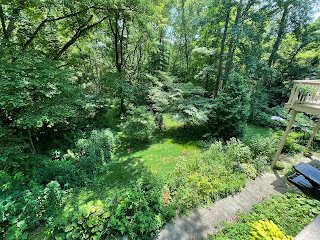You never really know where inspiration or the wisdom you need might come from. Sometimes it comes through the beauty or intricacies of nature, sometimes through a self-help book or sacred readings, or sometimes a person’s words may impart what we need to hear, when we need to hear it. But now and then, it comes through seemingly unconventional means.
This past 4th of July weekend, I finished up season four of The Bear on Hulu. If you haven’t watched it yet, I recommend it’s often wild and often slow pace. It’s minimal dialogue, yet deep emotion carried by body language and camera work. It’s anger and love and loyalty, mostly all contained in a high-end restaurant kitchen. Oh yes, and the food prep! If nothing else, you will learn a lot about a world to which most of us will never be exposed.
But for me, the wisdom came, not while watching the show, but a few days afterwards, while recalling an episode. Without giving too much away, this last season dealt with the fact that the restaurant was teetering on financial disaster. They needed to increase their profits and quotas, and do it quickly. The number-crunchers set a deadline and put a running “doomsday clock” in the kitchen for all to see. They looked at various ways to trim the fat and eliminate waste. Kitchen staff was tasked to reduce each order prep down to three minutes. One suggestion the entire staff agreed upon, except for the head chef, was to reduce the number of components in each dish. I found the idea of breaking down the whole sensual and creative culinary experience into mathematical problems and solutions rather curious. Even though my head understood their fiscal need for efficiency, it was almost annoying when they referred to the exquisitely prepared filets and scallops and asparagus as “components.”
Did that run-on sentence make you tired just reading it? Yeah. That’s because, like the entrees at the restaurant and my one-and-one-third acres, it has too many components!
This is ultimately about the need to simplify. And in some ways, I thought I was simplifying, by taking up lawn space and reducing the need for mowing. But what about my headspace? Like the kitchen staff who were overwhelmed, over-worked, and starting to become “over it,” reducing the components I need to tend to is necessary for my personal morale. Maybe I needed this logical/mathematical perspective to make me understand something my creative, designing and naturalist self couldn’t. Because More is the name of the game for some of us. More native trees for larval hosts. More beautiful flowers for the pollinators…and me. More flowering and berry-producing shrubs for the birds. More designed vignettes with perches for humans. Not money. Not clothes. Not toys. Just more spaces to fill with beauty and bounty.
But in striving for more sustainability in nature, my methods have become unsustainable for me. I think for gardeners, there also comes a time to “downsize,” not just in our homes but also outside of them. So, for me, nearing my 69th birthday, it is time to stop. It is time to reduce my components. It is time to transplant and seed over with grass or clover. It is time to thin everything that has doubled or tripled in size over the years. It is time to maybe let nature dictate a little more of what goes where. It is time to make better use of the sun at the “edges.” And now that hosting humans may not be in the cards any longer, perhaps the extra chairs and planters and rugs can go. No longer components to set up in spring and take down in late fall.
I know this downsizing will take work, like the chefs analyzing their methods, re-working them, and continually practicing to get a pasta dish cooked and plated in three minutes. But, once it’s done, it’s done. Efficiency achieved. So, no more acquisitions next year, just maintenance. Choosing flowers for just four or five planters, not eight or ten. Just pulling up what doesn’t belong. Just walking the paths and admiring the beauty. Slow, quiet, methodical maintenance. Doesn’t that finally sound rather peaceful?
It does to me.



